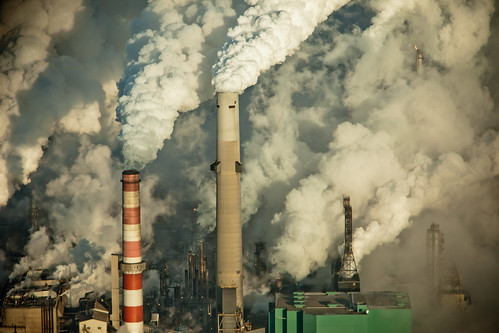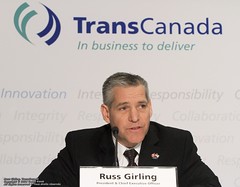隨著2015年到來,「基石XL」(Keystone XL)輸油管議題預期在北美釀成新的衝突。
6年來首次 共和黨可望促成油管興建
美國共和黨主張,艾伯塔省-墨西哥灣(Alberta-Gulf Coast)沿岸輸油管線能創造工作機會和能源安全,而共和黨如今在參眾兩院皆佔有多數優勢,這是6年前加拿大橫加公司(TransCanada Corporation)申請管線許可後的頭一遭。
由於該條輸油管跨越國界,必須由總統簽署許可。共和黨表示,將在1月提案,以國家利益迫使歐巴馬簽署輸油管計劃許可。
總長1,179英哩(1,897公里),直徑36吋的輸油管,從加拿大艾伯塔省的Hardisty運送稀釋瀝青至美國內布拉斯加州的斯蒂爾市,連接現有的輸油管,最後抵達墨西哥灣煉油廠。煉油廠的成品大部分用於出口。
不利氣候變遷談判 環團聯合聲明反對
歐巴馬說他正在等待內布拉斯加州管線訴訟判決,但也暗示基石XL不利對抗氣候變遷的國際合作。
國界兩邊的環團將阻擋基石XL視為對抗氣候變遷的第一要務,數年來各種抗議活動吸引了數千民眾冒著被逮捕的風險,在白宮和北美其他地方表達訴求。
近來,許多全美規模最大、最有影響力的環團聯合發出備忘錄給歐巴馬,引用最新數據指出「(輸油管計劃通過)將擴張髒能源砂油的開發,每年增加數百萬噸碳汙染,加速氣候變遷。」
國際石油變革組織(Oil Change International)、自然資源保護委員會(Natural Resources Defense Council)、保育選民聯盟(League of Conservation Voters)、塞拉俱樂部(Sierra Club)、350.org、自由派草根組織CREDO以及無畏的內布拉斯加(Bold Nebraska)12月18日發給歐巴馬備忘錄,分析當前的石油和運輸經濟學以及輸油管計劃對氣候的影響。
備忘錄引用政府間氣候變化專門委員會(IPCC)的報告,強調全世界75%到80%的化石燃料不可開發,以避免嚴重的氣候變遷衝擊。
「市場力量和最新的氣候科學皆顯示基石XL輸油管計劃不該被核准,因為砂油擴張將增加碳排放,加劇氣候變遷並危及我們的未來,為的不是這個國家,而是砂油業的利益,卻讓所有人承受汙染的後果。」自然資源保護委員會國際計劃專職律師Anthony Swift說。
無視國際油價情勢 業者看好數億GDP貢獻
加拿大持續努力建造輸油管,並擴張砂油的開發。前陣子的利馬氣候峰會上,僅管分析師指出砂油碳排會讓加拿大無法達成其2020年的減碳目標,加拿大政府代表表示他們不會控制砂油的碳排。
橫加公司總裁兼執行長則指出,美國國務院的最終補充環境影響報告書(FSEIS)下結論,基石XL可以創造42,000個直接和間接工作機會和34億美國GDP。而且基石XL經過的29個郡中,有17個財產稅收將增加10%以上。
備忘錄也指出,替代運輸方式不適用於砂油。鐵路運輸砂油的成本和限制相當清楚,顯示只有輸油管一種方式能提升砂油生產規模。
為了保持獲利,砂油業將需要便宜的替代運輸方式、高油價以及可控管的生產成本。不過環團主張,橫加公司自2008年提出申請後,形勢已經出現變化。油價大幅下跌,全球油品市場已經改變,石油輸出國組織(OPEC)對價格下跌的反應已經被證明是錯誤的。環團強調,「目前的油價低於需要砂油業擴張的水準。」
備忘錄主張,「高價格、高汙染的砂油」不應被開發,才能達成國家和國際的氣候變遷目標,將暖化控制於2度C以內。環團表示,各種因素顯示基石XL並未通過歐巴馬去年的「氣候測驗」,應拒絕其輸油管線許可。
A renewed battle over the Keystone XL tar sands pipeline is shaping up for the new year in North America.
The Republicans, who favor the Alberta-Gulf Coast pipeline because of the jobs and energy security they say it will create, will have a majority in both houses of Congress for the first time since TransCanada Corp. filed an application for the pipeline six years ago.
They plan to bring up legislation early in January to force President Barack Obama to sign the required Presidential Permit for the pipeline that declares it to be in the national interest. The Permit is needed because Keystone XL would cross an international border.
The proposed 1,179-mile (1,897 km), 36-inch-diameter pipeline would carry diluted bitumen from Hardisty, Alberta, and extend south to Steele City, Nebraska, where it would join existing pipelines to carry the dilbit to refineries on the Gulf of Mexico. The refined product is planned largely for export.
Obama says he is waiting for a lawsuit over the pipeline route in Nebraska to be settled, but has signaled that he views Keystone XL as a threat to international efforts to limit climate change.
Environmentalists on both sides of the border have made stopping the Keystone XL pipeline central to their efforts to fight climate change, and for years demonstrations have attracted thousands of people willing to be arrested in front of the White House and elsewhere across North America.
Most recently, some of the largest, most powerful environmental groups in the United States sent a memo to President Obama citing new data that shows “it would expand development of dirty tar sands oil, turbo-charging climate change by adding millions of tons of carbon pollution to the atmosphere every year.”
The memo, delivered to Obama December 18 by Oil Change International and the Natural Resources Defense Council, along with the League of Conservation Voters, the Sierra Club, 350.org, CREDO, and Bold Nebraska, analyzes current oil and transport economics and the climate impacts of the proposed pipeline on tar sands expansion.
It cites a November report from the Intergovernmental Panel on Climate Change report stating that 75 to 86 percent of the world’s fossil fuels must stay undeveloped to escape serious impacts of climate change.
Canada continues trying to build the pipeline and expand tar sands development. At recent international climate talks in Lima, Peru, Canadian government officials said they would not seek to control emissions from tar sands, even though analysts say these emissions would make it virtually impossible for Canada to reach its 2020 target for greenhouse gas reductions.
“Market forces and the latest climate science make it clear Keystone XL shouldn’t be approved because it would drive up carbon pollution, making climate change worse and jeopardizing our future. It’s not a plan to help our country. It’s about big profits for big oil – and big pollution for the rest of us,” said Anthony Swift, staff attorney in Natural Resources Defense Council’s international program.
But TransCanada’s president and CEO Russ Girling points out that the U.S. Department of State’s Final Supplemental Environmental Impact Statement (FSEIS) concluded that Keystone XL would create 42,000 direct and indirect jobs and $3.4 billion in U.S. GDP. Also, 17 of the 29 counties that Keystone XL moves through will see their property taxes increase by more than 10 percent.
In order to succeed profitably, the industry will need cheap transport options, high oil prices, and manageable production costs. But the environmental groups argue that things have changed since TransCanada proposed the pipeline in 2008, making profitability and environmental safety unlikely.
Oil prices have fallen sharply, the global oil market has changed, and assumptions about OPEC’s response to falling prices are proving wrong, the enviros point out. “Prices now are below the break point needed for tar sands expansion.”
The memo also argues that other proposed transport options will not work for tar sands. The costs and limitations of rail transportation for tar sands crude have become clearer, demonstrating that only pipelines can support the scale of the planned expansion of tar sands production.
The memo urges that “High cost, high pollution tar sands crude” must be left in the ground in order to achieve our national and international climate goal of limiting global warming to less than 2 degrees Celsius.
Together, the environmentalists say, these factors provide fresh evidence that the proposed Keystone XL tar sands project fails the “climate test” President Obama laid out last year and should be rejected.
※ 全文及圖片詳見:ENS







